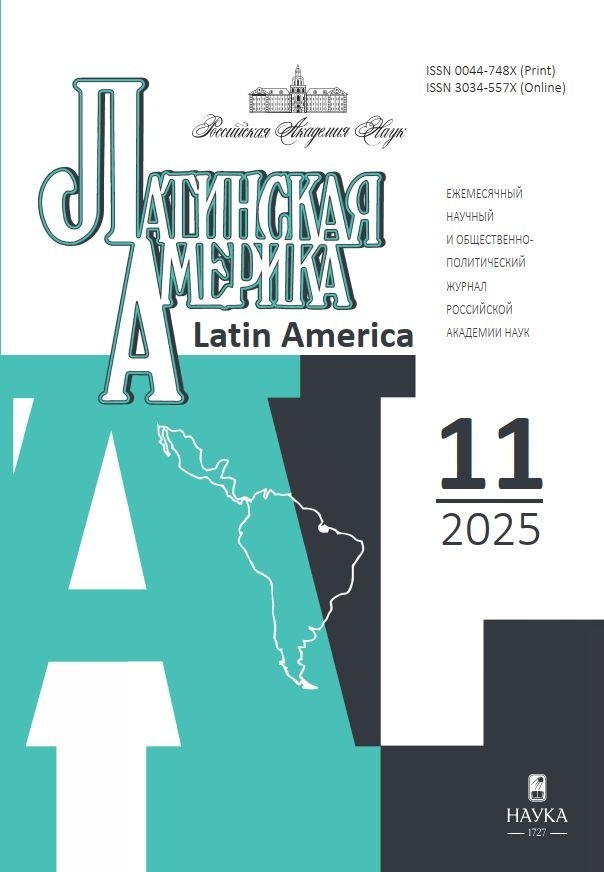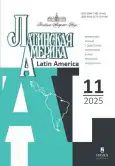Проблемы исторической памяти и формирование концепции "будущее важнее прошлого" в Испании 1960-х годов
- Авторы: Гранцева Е.О.1
-
Учреждения:
- Институт всеобщей истории
- Выпуск: № 11 (2025)
- Страницы: 83-96
- Раздел: Иберийский аспект
- URL: https://gynecology.orscience.ru/0044-748X/article/view/696040
- ID: 696040
Цитировать
Полный текст
Аннотация
После установления франкистского режима официальная память о событиях гражданской войны 1936-1939 годов была сведена к памяти «победителей», а наследие Второй Испанской Республики предано забвению. В 1960-е годы идеологами режима была сформулирована обновленная повестка «мира как ценности». Статья посвящена исследованию проблем исторической памяти в контексте трансформации идеологических установок франкизма, а также реакции на них интеллектуальной оппозиции. Источниковой базой для нее стали официальные документы франкистской эпохи, в том числе, связанные с кампанией «25 лет мира» и материалы журнала Cuadernos para el Diálogo, представляющие взгляды интеллектуальной оппозиции режиму. Проведенное исследование показало, что трансформация исторической памяти в Испании 1960-х гг. сопровождалась изменением идейных установок режима от торжества победителей к идее «мира как ценности», консолидацией антифранкистской оппозиции, продвижением идей «примирения» и «диалога» в интеллектуальных кругах, где одновременно формировался тезис о том, что «будущее важнее прошлого», ставший ключевым для испанского общества в период перехода от франкизма к демократии.
Ключевые слова
Об авторах
Екатерина Олеговна Гранцева
Институт всеобщей истории
Автор, ответственный за переписку.
Email: kgrantseva@yandex.ru
ORCID iD: 0000-0001-7449-1314
кандидат исторических наук, старший научный сотрудник
Россия, 119334 Москва, Ленинский пр-т, д. 32аСписок литературы
- Наварро Наварро Х. Ф., Гранцева Е. О. Тени прошлого в Испании: историческая политика и общественная память о гражданской войне и франкизме. — Концепт: философия, религия, культура. М., 2021, Т. 5, № 4, сс. 96-113. [Navarro Navarro J.F., Grantseva E.O. Teni proshlogo v Ispanii: istoricheskaya politika i obshchestvennaya pamyat' o grazhdanskoy voyne i frankizme [Shadows of the Past in Spain: Historical Politics and Public Memory of the Civil War and Francoism)]. Kontsept: filosofiya, religiya, kul'tura. Moscow, 2021, T. 5, no. 4, pp. 96-113 (In Russ.)].
- Ley 46/1977, de 15 de octubre, de Amnistía // Boletín Ofi cial del Estado. – No 248, 17 de octubre de 1977.
- Abdón M., Soto Á. El final del franquismo, 1959-1975. La transformación de la sociedad española. Madrid, Historia 16-Temas de Hoy, 1997, 129 p.
- Филатов Г. А. Общество потребления в идеологии второго франкизма. —Латиноамериканский исторический альманах. М., 2020, № 28, сс. 267-284 [Filatov G. A. Obshchestvo potrebleniya v ideologii vtorogo frankizma [Consumer society in the ideology of the second Francoism]. Latinoamerikanskiy istoricheskiy al'manakh. Moscow, 2020, no. 28, pp. 267-284 (In Russ.)].
- Juliá S. (coord.). Víctimas de la guerra civil. Madrid, Ediciones Temas de Hoy, 1999, 440 p.
- Juliá S. (dir.). Memoria de la guerra y del franquismo. Madrid, Fundación Pablo Iglesias-Taurus, 2006, 346 p.
- Aguilar Fernández P. Políticas de la memoria y memorias de la política. El caso español en perspectiva comparada. Madrid, Alianza Editorial, 2008, 583 p.
- Cuesta J.La odisea de la memoria. Historia de la memoria en España. Siglo XX. Madrid, Alianza Editorial, 2008, 496 p.
- Espinosa F. Contra el olvido. Historia y memòria de la guerra civil. Barcelona, Crítica, 2006, 350 p.
- Реншоу Л. Правда вскрывается: как поменялись местами разоблачения и утаивания в «политике памяти» в Испании. — Новое литературное обозрение. М., 2009, №100, сс. 475-493. [Renshaw L. Pravda vskryvayetsya: kak pomenyalis' mestami razoblacheniya i utaivaniya v «politike pamyati» v Ispanii [Uncovered: reversals of exposure and concealment in Spain’s memory politics]. Novoye literaturnoye obozreniye. Moscow, 2009, no. 100, pp. 475-493 (In Russ.)].
- Muñoz Soro J. Cuadernos para el Diálogo (1963-1976). Una historia cultural del segundo franquismo. Madrid, Marcial Pons Historia, 2006, 401 p.
- Gómez Cuesta C. La construcción de la memoria franquista (1939-1959). Mártires, mitos y conmemoraciones. Studia histórica. Historia contemporánea, 2007, no. 25, pp. 87-123.
- Хенкин С.М. Испания: полемика вокруг исторической памяти. — Контуры глобальных трансформаций: политика, экономика, право. М., 2019, № 12 (4), cc. 72–87. [Khenkin S.M. Ispaniya: polemika vokrug istoricheskoi pamyati [Spain: the controversy over historical memory]. Kontury global'nykh transformatsii: politika, ekonomika, pravo. Moscow, 2019, no. 12 (4), pp. 72-87 (In Russ.)].
- Филатов Г.А. Проблема "двух Испаний" в период правления Франсиско Франко. — Вестник Московского государственного лингвистического университета. Гуманитарные науки. М., 2014, cc. 632-640 [Filatov G.A. Problema "dvukh Ispaniy" v period pravleniya Fransisko Franko [The problem of the "two Spains" during the reign of Francisco Franco]. Vestnik Moskovskogo gosudarstvennogo lingvisticheskogo universiteta. Gumanitarnyye nauki. Moscow, 2014, pp. 632-640 (In Russ.)].
- Филатов Г. А. Система контроля над СМИ и пропагандой во франкистской испании. — Новая и Новейшая история. М., 2017, Выпуск 2, cc. 40-48 [Filatov G. A. Sistema kontrolya nad SMI i propagandoy vo frankistskoy Ispanii [The system of control over the media and propaganda in Francoist Spain]. Novaya i Noveyshaya istoriya. Moscow, 2017, Vypusk 2, pp. 40-48. (In Russ.)].
- Гранцева Е.О. Возможно ли согласие? Историческая память о событиях ХХ в. в повседневной жизни и законодательстве современной Испании. — Латиноамериканский исторический альманах. М., 2018, № 19, сс. 316-336 [Grantseva E.O. Vozmozhno li soglasie? Istoricheskaya pamyat' o sobytiyakh XX v. v povsednevnoi zhizni i zakonodatel'stve sovremennoi Ispanii [Is consent possible? Historical memory of the events of the twentieth century in everyday life and legislation of modern Spain]. Latinoamerikanskiy istoricheskiy al'manakh. Moscow, 2018, no. 19, pp. 316-336 (In Russ.)].
- Ley 20/2022, de 19 de octubre, de Memoria Democrática. Jefatura del Estado // Boletín Oficial del Estado. – No 252, 20 de octubre de 2022
- Morente F. La historia de los intelectuales durante el franquismo: un ensayo bibliográfico. Bulletin d’Histoire Contemporaine de l’Espagne, 2016, no. 50, pp. 163-194.
- Gil Vico P. Ideología y represión: la causa general: Evolución histórica de un mecanismo jurídico-político del régimen franquista. Revista de Estudios Políticos (Centro de Estudios Políticos y Constitucionales), 1998, no. 101, pp. 159-189.
- Boletín Oficial del Estado. – No 137, 17 de mayo de 1939.
- Martínez Hoyos F. Así construyó el franquismo su propia memoria histórica. La Vanguárdia, 17.03.2025.
- Boletin oficial del Estado. – No 93, 2 de abril de 1940.
- Calleja J.M. El Valle de los Caídos. Barcelona, Espasa Libros, 2018, 228 p.
- Arias L., Luis Martín F. España cumple 25 años de paz, Suplemento nacional de la prensa del Movimiento (1964). Entre la propaganda y la desafección. Revista Internacional de Historia de la Comunicación, 2021, no. 1, pp. 403-450.
- Franco, ese hombre, 1964, документальный фильм, Испания, реж. Х.Л. Саенса де Эредиа.
- Un Gran Hombre (Víctor Manuel San José), 1965. Available at https://www.cancioneros.com/nc/9234/0/un-gran-hombre-victor-manuel-san-jose (accessed 25.03.2025)
- González Cuevas P. C. De historia y política: Ricardo de la Cierva y la historiografía franquista. Alcores, 2018, no. 22, pp. 191-221.
- Amiguet Molina T. M. Julián Grimau, el último ejecutado de la Guerra Civil. La Vanguárdia, 19.04.2018.
- Altares P. Biografía sin animo de hacer historia. Cuadernos para el Diálogo, 1972, no. 100.
- Vilar S. La oposición a la dictadura. Protogonistas de la España democrática. Barcelona, Aymá, 1976, 738 p.
- Razón de ser. Cuadernos para el Diálogo, 1963, no. 1, pp. 1-2.
- Aranguren J. L. L. Los dialogos de Cuadernos para el Diálogo. Cuadernos para el Diálogo, 1972, no. 100.
- Diálogo de las Españas. Mexico, 1963, octubre.
- Más allá del perdón. Cuadernos para el Diálogo, 1966, no. 32, pp. 1-2.
- Ruiz-Giménez J. Fin de vacaciones: los problemas politicos españoles, a examen. Cuadernos para el Diálogo, 1967, no. 47.
- Laitin D. D. Resurgimientos nacionalistas y violencia. Sistema. Madrid, 1986, pp. 193–230.
- Entre el temor y esperanza. Cuadernos para el Diálogo, 1970, no. 87, p. 3.
- Cuadernos para el Diálogo, 1972, no. 105, p. 39.
- Cuadernos para el Diálogo, 1973, no. 115.
- Pascua M. Oro español de Moscú. Cuadernos para el Diálogo, 1970, no. 81-82, pp. 11-18.
- Carta desde el exilio. Cuadernos para el Diálogo, 1975, no. 141-142, p. 55.
- Cuadernos para el Diálogo, 1975, no. 144, p. 16.
- Мовельян Аро Х. Преодолевая тяжкое «наследие Тиберия». Представления уходящего поколения республиканцев о «преобразовании» и «примирении» в эпоху перехода Испании от диктатуры к демократии. — Латинская Америка. М., 2023, № 7, сс. 77-87 [Movelyan Aro J. Preodolevaya tyazhkoye «naslediye Tiberiya». Predstavleniya ukhodyashchego pokoleniya respublikantsev o «preobrazovanii» i «primirenii» v epokhu perekhoda Ispanii ot diktatury k demokratii [Overcoming the Heavy "Legacy of Tiberius." The Outgoing Generation of Republicans' Perceptions of "Transformation" and "Reconciliation" in the Era of Spain's Transition from Dictatorship to Democracy]. Latinskaya Amerika. Moscow, 2023, no. 7, pp. 77-87 (In Spanish].
- Garagorri P. Una forma del diálogo: el recuerdo // Cuadernos para el Diálogo, 1964, no. 5-6, pp. 22-23.
- En la muerte de Picasso. Cuadernos para el Diálogo, 1973, no. 116, pp. 10-11.
- Arbeloa V. M. Recuerdo de Julián Besteiro. Cuadernos para el Diálogo, 1966, no. 32, pp. 16-17.
- Aguilar Navarro ¿De nuevo a la guerra? Cuadernos para el Diálogo, 1975, no. 136-137, pp. 17-18.
- Díaz E. Recención a M. Tuñón de Lara “Storia della Repubblica e della Guerra civile in Spagna. Cuadernos para el Diálogo, 1966, no. 39, p. 39.
Дополнительные файлы








